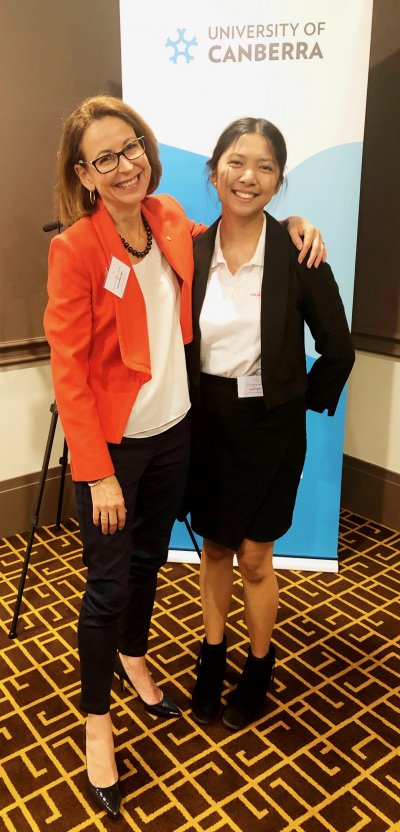Photo: BroadAgenda Chief Editor, Virginia Haussegger, with some of the Country to Canberra Power Trip winners from across Australia.
Australia’s national capital hosted both ends of the feminist spectrum this week for a whirlwind of talkfests, mentoring, reviewing and energising old guard femocrats, while inducting a new wave of young feminist activists.
Monday’s gathering at MoAD ‘Revisiting the Revolution: Whitlam and Women’ was beautifully offset by the arrival of 18 rural and regional schoolgirls form every corner of the continent, here for the annual ‘Country to Canberra’ Power Trip.
The indefatigable Hannah Wandel, ACT Young Australian of the Year, and her incredibly energetic team have driven 32,000 km across the nation to run workshops for some of Australia’s most isolated young women. Hannah set participants a challenge to write or video their response to the question: ‘Overcoming the odds – how can we push through barriers to achieve gender equality?’
The 18 winning entrants won a trip to Canberra and a life changing opportunity to meet with politicians, change makers, community and business leaders, and new mentors to connect, talk, and workshop their ideas … for a better gender deal. BroadAgenda Chief Editor, Virginia Haussegger met the group for a speed mentoring session. Her response, “I’m speechless. Utterly blown away by the power and passion in these girls! Australia’s future looks fabulous. And feminist!”
You can read and view the girls winning entries on the Country to Canberra website, but here are a few of our favourites:
Jessica Bennett, 17ys, from Orange, NSW
Maggie Sheehan, 17 ys, from Ulverstone, Tasmania
Sienna Bordington, 17ys, Coffs Harbour, NSW
Essay: Overcoming the odds – how can we push through barriers to achieve gender equality?
Ianna Lalim, 18 ys, Katherine, Northern Territory
Growing up it never occurred to me that my gender might determine anything about the choices I had in life beyond public bathrooms and the box I ticked in official-looking forms. Certainly, I did not imagine that my gender could speak for me. My parents taught my brothers and I that it is hard work, determination, and using our intelligence that plays the strongest roles in what we will one day become. And for years this philosophy was untouched. But see the thing is that as a child it is easy to live in that bliss that ignorance allows.

When I was in middle school my class was to do a performance in which the main characters were prophets. There were seven spots and nine people auditioned, only two girls, myself included. The deciding was merely a class affair and we had a visitor in the room. She was a woman. Our teacher asked the visitor if she would like to pick. She chose all boys. And her reasoning? Prophets were powerful, authoritative people and she thought boys would better fill those shoes. Our readings were inconsequential, that I had memorized my part to stand out was inconsequential. Gender was the deciding factor. And just like that, my ignorance towards gender inequalities was cracked.
That women are under-represented in science, technology, engineering and maths is sadly obvious (Foley, 2018). Women are so often linked to domestic tasks over men, and are oft labelled with stifling stereotypes, and laden with discriminative clothing and behavioural expectatons. I mentioned earlier that a younger me did not know gender inequality. I lived in an ignorance but that ignorance was the truth; gender is not a deciding factor in who we can be. That it might be is socially constructed, that it could speak on behalf of us is something taught. I believe that the solution lies in education. It is our duty to teach, and show, and represent for younger generations that they are not constrained by their gender. The future of gender equality is bright because we are educated on this, and because of programs like Country to Canberra which specifically open doors to show girls their potential.
Despite the gender inequalities around me I firmly believe that gender will not play a role in deciding my future and I plan to succeed and play my own part in demonstrating this truth.




